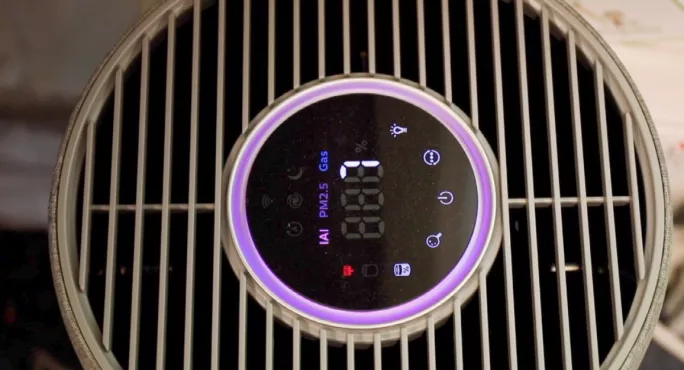Can air purifiers halt the Covid spread in schools?

A major study has been launched into whether using air cleaners can reduce the spread of Covid-19 in schools.
The study, which is being carried out in 30 primary schools in Bradford, will be trialling two different approaches to disinfecting the air.
The aim of the experiment is to explore how environmental technology could be used to provide “safer and healthier spaces” for pupils during the Covid pandemic.
The academic leading the research has said there is an “urgent” need to identify technology that can stop the spread of the coronavirus in schools.
Ventilation: Changes made to improve school ventilation ‘very small’
Vaccinations: ‘Far too early’ for most primary pupils to have vaccine
CO2 monitors: Majority of school CO2 monitors not yet delivered
How will it work?
The first approach will focus on filtering air by passing it through a high-efficiency particulate air (HEPA) filter.
As well as viruses, these filters are designed to trap unwanted particles such as dust, pollen, bacteria, viruses and hair from the air while allowing clean air to be pushed back out into the environment.
The second approach cycles the air through an enclosed unit where it is exposed to an ultraviolet (UV-C) germicidal light that kills viruses.
The UV-C active air device is designed to clean the air while people are present.
The UV-C devices will provide an extra layer of protection for the students, staff and visitors, providing the highest-quality air and helping to reduce sickness and absenteeism.
Why is this important for schools?
The scientists involved in the study are “confident” that the technologies will reduce the risk of Covid being spread by microscopic respiratory particles carried in the air (aerosol transmission).
Schools currently face the challenge of keeping classrooms well ventilated but also comfortable as we move deeper into winter.
The government is delivering 300,000 CO2 monitors to schools this term, but so far, less than half have been delivered.
How will the trial be carried out?
Each of the 30 primary schools taking part in the study will have devices that track the quality of the air inside the building.
Twelve schools are acting as a control, which means they will carry on as usual and will not have any air purification technology installed.
Of the remaining 18 schools, 10 have had portable air filtration devices fitted in classrooms, which are already working.
The final eight schools are in the process of having the wall-mounted cleaners fitted on classroom walls.
Over the coming weeks, scientists will collect data on the number of children in the schools who develop a Covid-19 infection or become ill with flu or asthma, and whether there is any difference in the levels of illness seen in those schools with the air purification devices.
Scientists have said it is possible that the air purification devices will also reduce the spread of other respiratory conditions.
The £1.85 million investigation is being funded by the Department for Health and Social Care and led by Professor Mark Mon-Williams from the University of Leeds.
Schools face an ‘urgent need’ on Covid
Professor Mon-Williams said: “Research has suggested that children have lost as much as half a year of schooling because of the disruption caused by the pandemic.”
He added that there was an urgent need to identify technologies that could be adopted by schools to try and stop the spread of Covid-19.
“We know that good ventilation can help disperse the aerosols that can cause infection, but in a busy classroom, ventilation alone will not be enough.
“Environmental technology offers a potential solution: it will enable schools to operate as normal as possible and hopefully reduce the risk of coronavirus spreading among pupils.”
Headteacher Matthew Langley, whose school is taking part in the study, said: “Good attendance is key to children being successful at school. As for many schools, Covid-19 caused huge disruption to Bowling Park Primary School.
“Repeated lockdowns created very real challenges for our children, families and staff as we all worked together to continue learning from home, but the greatest problems were caused by individual cases of Covid-19 that led to bubbles, classes or groups of classes being closed for up to 10 days at a time.
“We are delighted to be part of this pilot study. It feels like a real step forward for us as we return to normal and try to make school as safe, consistent and positive for all our children, families and staff.”
Councillor Imran Khan, deputy leader of Bradford Council and portfolio holder for education, said: “We are proud that Bradford is taking a lead in finding a solution to fighting Covid in schools.
“Schools are the best place for children to learn and develop. One of the worst impacts of the pandemic has been on the disruption to children’s education.
“The findings of this study could help keep pupils safer in schools by reducing the risk of the virus spreading in classrooms and so reducing the number of days of lost learning.
“We are grateful to our schools who are involved in the pilot scheme and look forward to hearing the results.”
You need a Tes subscription to read this article
Subscribe now to read this article and get other subscriber-only content:
- Unlimited access to all Tes magazine content
- Exclusive subscriber-only stories
- Award-winning email newsletters
Already a subscriber? Log in
You need a subscription to read this article
Subscribe now to read this article and get other subscriber-only content, including:
- Unlimited access to all Tes magazine content
- Exclusive subscriber-only stories
- Award-winning email newsletters
topics in this article



